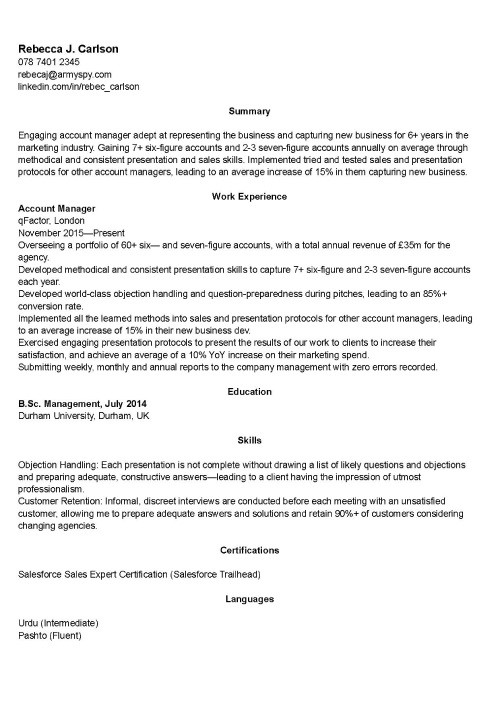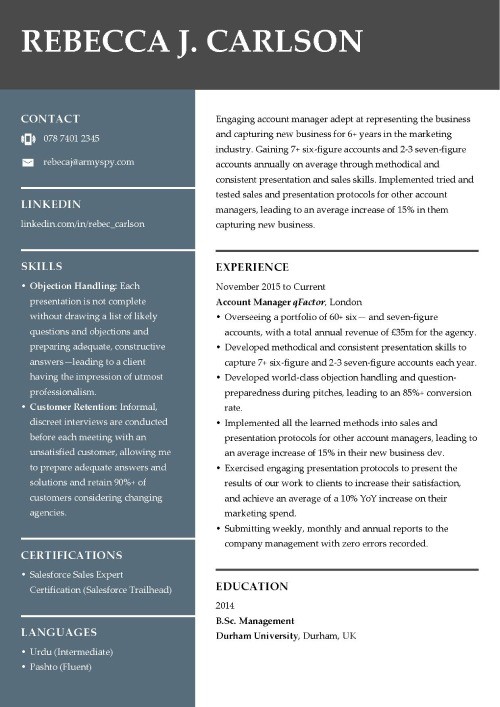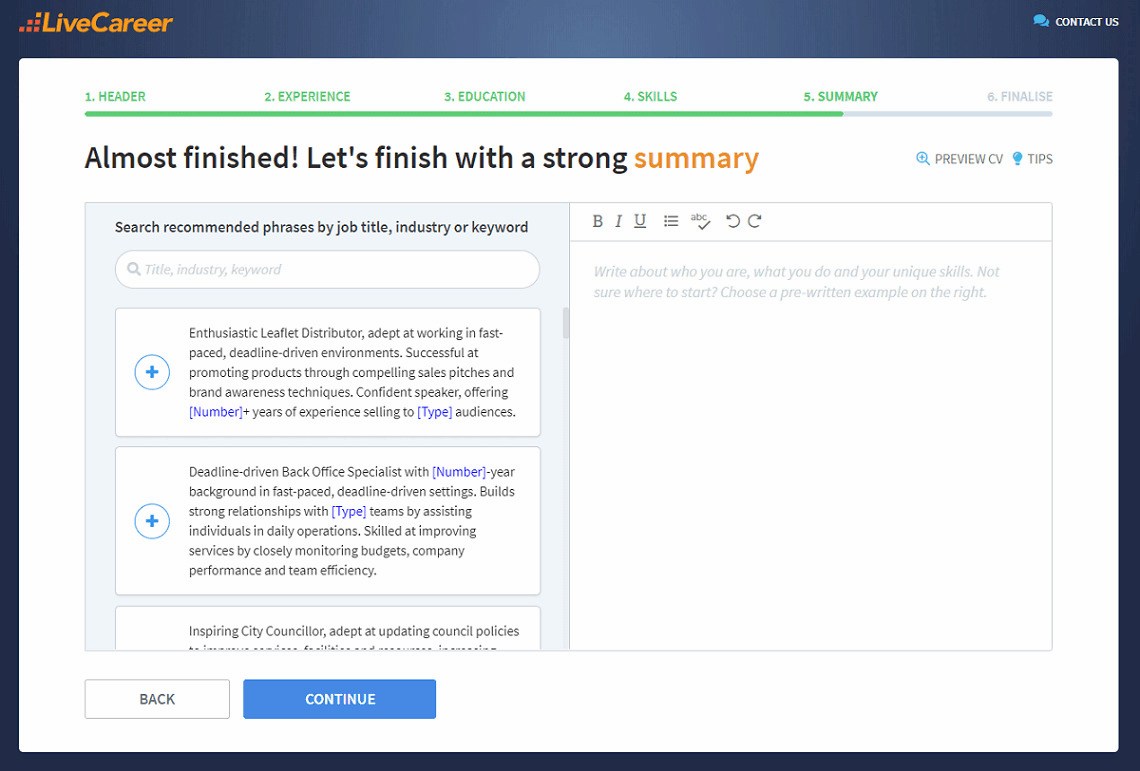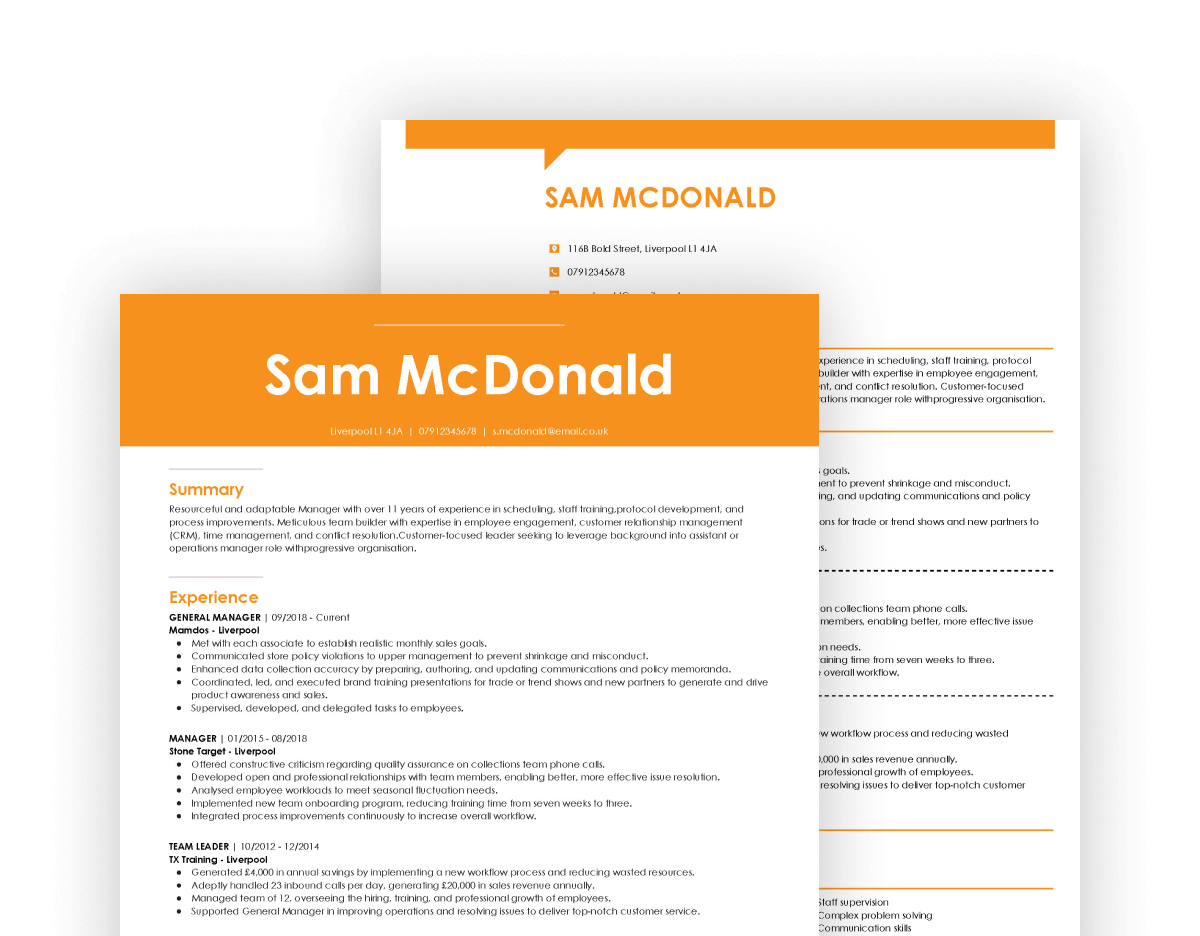Create a professional CV now!
 NO
NO YES
YESOur customers were hired by:
Presentation skills are the abilities needed to deliver compelling presentations to varied audiences. They include being aware of your tone of voice, your body language and your ability to use technology to enhance your presentations. If you want to be able to deliver a message well, then you need effective presentation skills.
But you can’t convince an employer you have great presentation skills without your own CV being presentable too. Putting your best foot forward while focusing on specific skills that the employer requires can be tricky—which is why we’re here with this guide.
Create an effective CV in minutes. Choose a professional CV template and fill in every section of your CV in a flash using ready-made content and expert tips.
Create a professional CV now!
 NO
NO YES
YESWe created the sample on the right using our builder. See other good CV examples like this one.
What are other important skills for a CV? Check:
Personal Info
Rebecca J. Carlson
078 7401 2345
rebecaj@armyspy.com
linkedin.com/in/rebec_carlson
Summary
Engaging account manager adept at representing the business and capturing new business for 6+ years in the marketing industry. Gaining 7+ six-figure accounts and 2-3 seven-figure accounts annually on average through methodical and consistent presentation and sales skills. Implemented tried and tested sales and presentation protocols for other account managers, leading to an average increase of 15% in them capturing new business.
Work Experience
Account Manager
qFactor, London
November 2015—Present
Education
B.Sc. Management, July 2014
Durham University, Durham, UK
Skills
Certifications
Languages
Below is the range of transferable skills, including interpersonal and technical ones, that together help you deliver a decent presentation. One side isn’t sufficient without the other, so here’s the complete process of putting together an effective presentation.
Your presentation’s subject will require a good understanding of the background information no matter what it is. The ability to work through data and facts fast and be prepared to pass them on in a processed, prepared, and performed format can make you invaluable.
Once you have the facts, you have to make somebody care about them. Here’s where writing skills come in, by articulating your ideas into clear, concise and understandable bites. Saying more with less words is a rare skill in a world of saying little with many.
PowerPoint and Google Slides are the go to’s for delivering visually compelling presentation decks. Learn to use them effectively, know the basics of design and readability and how to keep your content simple, impactful and backed up by visuals. And knowing how to present remotely with Zoom or Teams is a must-know too.
Umm...yeah...exactly. Being articulate comes naturally to some, but there is no shame in practising sounding smart. No actor walks out onto the stage without knowing their lines, and neither should you. Practice out loud until you are convinced by what you hear.
Not reading what’s on the slides is a good start. The slides should contain general points, while you present the detailed elaboration energetically. Levity, honesty and humour go a long way in engaging your audience and leading them towards your goals.
Sometimes, the best decisions are made on the fly. If you notice your audience start dozing off or fidgeting, it might be time to go off-script and engage them with something unusual, asking some questions or including them in a different way.
Even saying ‘well, I can see this is putting you to sleep, so let’s—’ can go a long way in bringing your audience back around.
An often overlooked part of presentation prep is objection handling. Think of the most likely comments or objections your audience might have after you finish your presentation. Then, prepare the most constructive and adequate answers you can. Being completely prepared doesn’t just make you look professional—it makes you a professional.
Now that you know how to prepare your presentations to a world-class level, it’s time to go through the process of preparing a presentable CV. So, how do you write a CV?
Wondering what to include in your CV? The CV personal statement, sometimes referred to as the CV profile, is perhaps the most key part of your CV—since it might be the only thing a recruiter reads when their eyes flash past your CV in a pile of a hundred (yes, they have that many).
Therefore, it’s only right to be presentable from the get-go.
Personal Statement
Engaging Account Manager adept at representing the business and capturing new business for 6+ years in the marketing industry. Gaining 7+ six-figure accounts and 2-3 seven-figure accounts annually on average through methodical and consistent presentation and sales skills. Implemented tried and tested sales and presentation protocols for other account managers, leading to an average increase of 15% in them capturing new business.
A strong CV summary will convince the recruiter you’re the perfect candidate. Save time and choose a ready-made personal statement written by career experts and adjust it to your needs in the LiveCareer CV builder.

The job description, or the work experience section as it’s commonly referred to, is like the main slides of your CV. It’s time to be concise, specific and engaging with your points. Leave the extremely detailed elaboration to the cover letter and interview. Here are some CV tips:
Work Experience
Account Manager
qFactor, London
November 2015—Present
Your CV education section can provide value by listing relevant modules or extracurricular activities that prove you have effective presentation skills. If you have several years of experience, just list your highest level of education and move on.
Education
BSc Management, July 2014
Durham University, Durham, UK
Relevant Modules: PowerPoint for Dummies, Public Speaking
Achievements: 3 presentations given at Management summits to 300+ students.
Most CV skills sections present nothing exciting at all. They are often just a laundry list of 5-10 skills that get looked over by the recruiter. Here’s how to get value out of your skills section:
Key Presentation Skills
The perfect CV doesn’t take the foot off the gas until the bottom of the page. Keep being presentable and list Languages, Certificates and Awards under separate, clear headings rather than bundled all together.
If you want to add a CV hobbies and interests section, make sure it somehow relates to presentation skills. A clear structure helps the eyes follow and find all the information that you need them to find.
Certifications
Languages
Many people hate presenting, and by some measures, public speaking is feared more than death. But it doesn’t have to be that way. By improving your presentation skills, you can boost your confidence and tackle that anxiety head on. You’ll also be gaining an important professional skill that’ll give your career a boost too.
Here’s how to improve your presentation skills:
Ever heard the old adage ‘if you fail to prepare, you prepare to fail?’ It’s particularly true for public speaking. Plan how you’re going to present and make notes about what you’re going to say. You don’t have to memorise every word you’re going to say verbatim, but get in the habit of preparing a list of key points to address.
We said it already, actors rehearse before they deliver their lines, and you should do the same before you present. Practising will give you confidence and the ability to present smoothly and professionally. Start off practising by yourself, then try out your presentation on a friend or family member.
Get a good night’s sleep before your presentation, make sure you’re not hungry, and ensure you’ve had your morning coffee if caffeine is your pick me up of choice. When your body is comfortable and operating at peak performance your presentation will reflect it.
This is a trick used by some of the best presenters out there. Tell some relevant personal anecdotes to illustrate the points you’re making. It makes you more relatable to your audience, and it makes you feel relaxed too, after all, talking about yourself is enjoyable.
Keep it appropriate for your audience, of course, but a few well-placed jokes will make you more engaging and make people pay more attention. Avoid throwing in obvious dad joke one-liners though, that doesn’t usually go down well. A few humorous observations about the subject at hand or about your job or industry will work much better.
Presentation skills can be learned, and one of the best ways of learning is watching an expert at work. Watch some TED talks about a topic of your choice and pay attention to good presenters that you work with. Take a note of what they do well and try to incorporate it into your own presentation tool kit.
Keep your body language open, stand up straight but not too stiffly, you should look like you’re having a friendly conversation with a trusted friend. And make sure you use your hands effectively. Simple gestures with open hands help you look natural, emphasise your points and help keep your audience focused on your message. It’s actually an urban legend that communication is 97% non-verbal, but it’s still very important.
Like it or not, we’re all doing more remote presentations these days. But presenting on Zoom is rather different from presenting in person. To keep eye contact, you need to look at the camera, not the other people. It feels strange at first, so consciously remind yourself to do it. And learn to share your screen and mute/unmute confidently, so you’re not fumbling around during an important presentation.
If you really want to up your presentation skills, look up your nearest Toastmasters International club. It’s a non-profit organisation that helps members improve their public speaking and leadership skills, perfect for being a power presenter. They provide training, and you get to practise your skills during club meetings.
We’ve already said it, preparation is key. But more specifically, getting yourself setup early and comfortable with your surroundings is a winner too. If you’re in the office, get to the meeting room early, if you’re presenting remotely then get your computer turned on and decks open in advance. You’ll not only be more comfortable, you’ll also get the chance to check for any potential glitches before you get started.
How to improve your presentation skills depends on the industry, your role and specific subjects of the talks, but there are common components and structures between all great talks in human history, according to Nancy Duarte.
In terms of hard software presentation skills, there are a range of PowerPoint and Keynote courses every, on Udemy, FutureLearn, and any other e-learning site you can think of.
And just like you should elaborate what’s on the slides in your presentation, do the same for your CV with an awesome cover letter. Altogether, that’s how you prove effective presentation skills in a nutshell. Good luck at the interview.
You don’t have to be a CV writing expert. In the LiveCareer CV builder you’ll find ready-made content for every industry and position, which you can then add with a single click.

If you’re still struggling with examples of presentation skills, or you just need some advice on how to improve your presentation skills, then let us know in the comments section. We’re here to help.
Our editorial team has reviewed this article for compliance with Livecareer’s editorial guidelines. It’s to ensure that our expert advice and recommendations are consistent across all our career guides and align with current CV and cover letter writing standards and trends. We’re trusted by over 10 million job seekers, supporting them on their way to finding their dream job. Each article is preceded by research and scrutiny to ensure our content responds to current market trends and demand.
About the author
Since 2013, the LiveCareer UK team has shared the best advice to help you advance your career. Experts from our UK editorial team have written more than one hundred guides on how to write the perfect CV or cover letter.
Rate this article:
Presentation skills
Average:

What should you include in a team leader CV in the UK? What's the best CV format for a team leader position? Get all the answers + team leader CV examples.
Check our guide on how to write a biomedical science CV. Use personal profile and skills examples or fill in the CV template for faster CV creation.
You tend to others’ busy schedules and productivity for a living. Take some time for yourself and invest in your executive assistant CV. Here’s a step-by-step instruction that works.
Our customers were hired by: